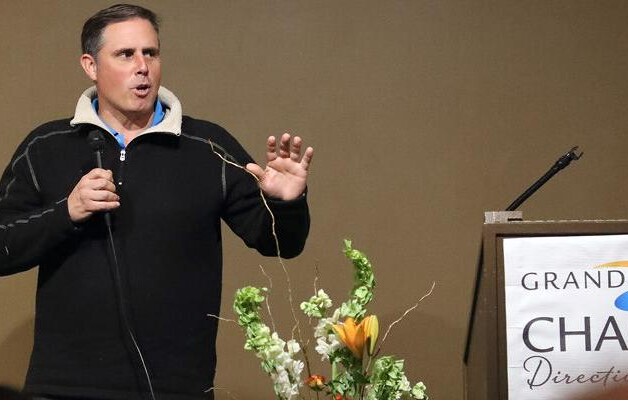Corporate consultant, broadcaster and retired U.S. Navy SEAL commander Jack Riggins spoke about the “culture of elitism” as the keynote speaker at Grand Island Area Chamber of Commerce’s annual meeting Thursday night.
How a person deals with daily adversity is his or her choice, he said. As a SEAL, Riggins was trained to overcome incredible stresses under the worst conditions.
Controlling your “inner-self” is key.
“We always have a choice in every response we make,” he said. “What we see is people who are extreme high-performers in any sector who generally exhibit a better attitude than their peers, exhibit effort in everything they do, and, of course, always have a positive energy.”
These 10 things require zero talent, he said, being on time, work ethic, effort, body language, energy, attitude, passion, being coachable, doing extra and being prepared.
“Every single one of those things, every morning, you control,” he said. “Every one of you that leads people, you look at those things all the time, whether you recognize it or not, and you start deciding, who’s a good teammate, who’s a bad teammate, who can I maybe trust to start promoting. And none of that has anything to do with talent, education. It’s something, each of those things, that we control.”
He added, “Do them well, and you’re in the boat club.”
Riggins emphasized that he is not “elite.” He’s a “regular Joe” from Fremont, who set goals and worked hard.
This can be done by setting “micro-goals.”
“I had lots of mentors who helped me learn the right things to build the building blocks to do something like SEAL team,” he said. “We’re just regular Joes, like everybody else, we just happen to do something pretty cool. But when you recognize it the numbers do say it is elite. So what do the elite do better than most everybody else?”
From such training come employees with a “competitive advantage,” those who try harder and are more capable.
“We do all we can to screen for a resilient and mentally flexible teammate,” Riggins said. “We all work hard to get where we’re going, but that’s the price of admission to anything if you want to be good and be better. For a leader, we’ve got to set that example.”
A lot of people fail “because they quit,” Riggins said, and they don’t realize plans “don’t happen on your timeline, they happen on a bigger timeline.”
“Don’t give up,” he said, “because everything can be achieved if we plan around the right people.”
Riggins told the audience of more than 500 Grand Island business and civic leaders how he was the first commander to drop a $3 million boat out of a C-17 aircraft at about 10,000 feet.
“That chute didn’t open on that boat, and it has all kinds of cryptological gear and things we don’t want the enemy to get,” he said.
What Riggins prioritized, he said, was his team.
“I was like, meh, it’s just a boat. We can replace a boat. Are my men OK?” he said. “I’ll tell you what. That’s just a boat. That’s a thing. I can replace things. I can’t replace people, at all, ever. So humans always, in our decision tree, come above things, money, etc. So we invest a lot of time in people.”
Everyone has a role, Riggins emphasized, in success.
The Russian military right now, he said, is “a laughingstock.
“They clearly haven’t figured out logistic support lines and how to value the people to get the mission done,” he said. “We work really hard to find the right role for that person, daily, and for the time ... for the greater good of the team.”
Leadership is critical to having such a team, Riggins said.
“In the military, we use ‘transformational leadership,’” he said. “I’m going to take somebody and evaluate them from the beginning, and I’m going to take from A to B to C to D, so they are better off for having been with me, as their leader, than when I first got them. And we take great pride in that.”

